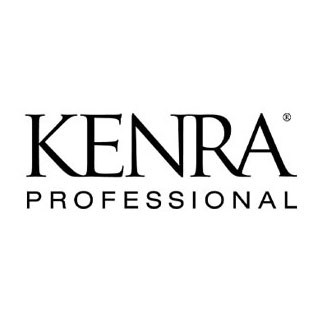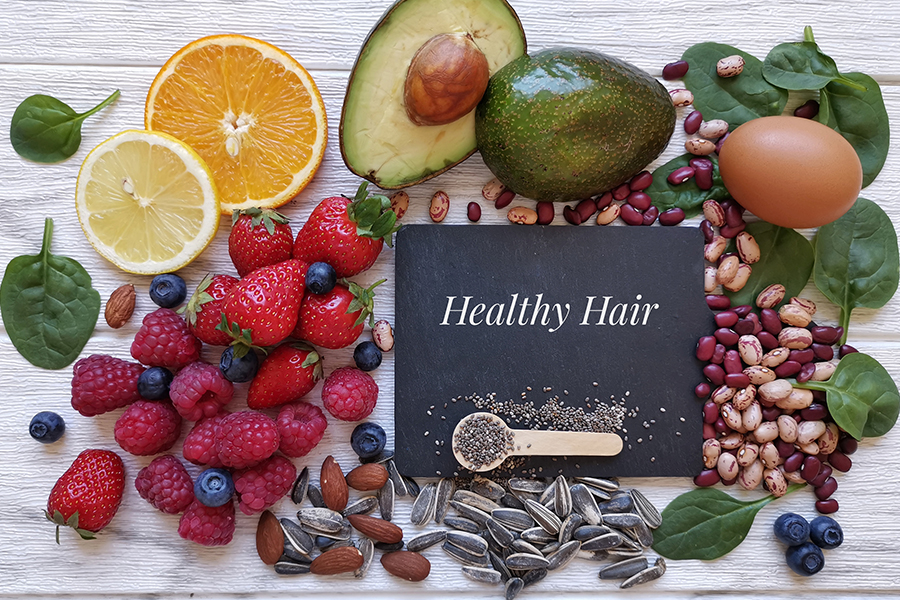How Diet and Eating Habits Can Help Your Hair Grow

By: Kenra Professional
March 2023
Real talk: We all want healthy, luscious hair. However, many factors may be quietly keeping us from achieving this goal—and while genetics certainly play a role in the quality of your hair, your diet and eating habits also have a significant impact. In this blog post, we’ll cover what your hair is made up of and which foods, food groups, and supplements to try if you’re experiencing hair loss or thinness in general.
The Structure of Hair
Your hair is made up of a protein called keratin, which is produced by your body and it relies on essential vitamins and nutrients from your diet. In other words? What we eat can play a crucial major role in promoting healthy hair growth.

What to Eat for Healthy Hair Growth
Protein
As mentioned, your hair is primarily made up of a protein called keratin, so it should come as no surprise that getting enough protein in our diet is essential for promoting hair growth. Biotin is essential for keratin production—in fact, biotin supplements are often marketed specifically for hair growth. Research shows consuming more biotin can help improve your hair growth should you have a biotin deficiency.
Protein helps with the production of hair cells and repairing any damage. When you're not consuming enough protein, your hair may become brittle, dry, and weak, and may even stop growing altogether.
It’s recommended that adults consume around 0.8 grams of protein per kilogram of body weight each day.Some good sources of protein for hair growth? Chicken, eggs, dairy, fish, and legumes such as lentils and chickpeas.
Vitamins and Minerals
In addition to protein, vitamins and minerals are also vital for promoting healthy hair growth. Some of the essential vitamins and minerals that can help improve the quality of your hair include Vitamins A, C, D, iron, zinc, and omega-3 fatty acids.
Vitamin A
Vitamin A is essential for healthy cell growth and repair, including the cells that make up your hair. It also helps to produce sebum—an oily substance that helps keep your scalp and hair moisturized. Good sources of vitamin A include sweet potatoes, carrots, spinach, and kale.
Vitamin C
Vitamin C is an antioxidant that helps protect your hair from damage caused by free radicals. It also helps your body produce collagen, which is a protein that is crucial for healthy hair growth. Good sources of vitamin C include oranges, strawberries, bell peppers, and broccoli.
Vitamin D
Vitamin D is essential for healthy hair follicles’ growth and maintenance. Without enough vitamin D, your hair can become thin, brittle—and even fall out. We don’t want that. While our bodies can produce vitamin D when we are exposed to sunlight, it can also be found in foods such as fatty fish and fortified dairy products.
Iron
Iron helps with your body’s production of red blood cells, which carry oxygen to the cells, including those that make up our hair. Iron deficiencies have been linked to hair loss: Without enough iron, hair can become weak, brittle, and prone to falling out. Good sources of iron include red meat, chicken, fish, and leafy greens such as spinach.
Zinc
Zinc is a mineral that’s essential for healthy hair growth and can help prevent hair loss. It’s involved in the production of sebum, which helps keep your scalp and hair moisturized. Good sources of zinc? Think oysters, beef, pumpkin seeds, and chickpeas.
Omega-3 Fatty Acids
Omega-3 fatty acids are a type of healthy fat that’s essential for overall health and can help promote healthy hair growth. These acids help keep your scalp and hair hydrated, which can prevent hair from becoming dry and brittle. Good sources of omega-3 fatty acids include fatty fish such as salmon and mackerel, as well as flaxseeds, chia seeds, and walnuts.
Water
In addition to the above nutrients, it is also essential to stay hydrated by drinking enough water. When our bodies are dehydrated, our hair can become dry, brittle, and prone to breaking. Drinking enough water can help keep your hair moisturized and healthy.
Eating habits
In addition to what we eat, our eating habits can also play a role in promoting healthy hair growth. For example, crash dieting, when you severely restrict your caloric intake, can lead to hair loss because the body isn’t receiving enough nutrients. When this happens, the body will prioritize vital functions, such as keeping the heart and brain functioning, over hair growth. Crash dieting can lead to stress on the body, which can also lead to hair loss.
What Not to Consume for Healthy Hair Growth
Another habit to avoid is consuming too much alcohol and caffeine. Both of these substances can lead to dehydration, which as mentioned, can cause hair to become dry and brittle. Excessive alcohol consumption can lead to a deficiency in essential vitamins and minerals, which can negatively impact hair growth.
Listen To Your Body
Finally, it's important to listen to your body's hunger and fullness cues. Your body provide signals in terms of cravings for what it’s current lacking when it comes to nutrition. We need a balance of nutrients in order to function properly, and depriving ourselves of certain foods or overeating can lead to an imbalance that can have a negative impact on your hair growth.
And there you have it. Consuming enough protein, essential vitamins and minerals, omega-3 fatty acids, and staying hydrated (that means drinking enough water!) can help promote healthy hair growth. Additionally, you want to avoid crash dieting and excessive alcohol and caffeine consumption, all of which can help prevent hair loss.
By prioritizing a balanced diet and healthy eating habits, you can help to ensure your hair is as healthy—and luscious as possible.
